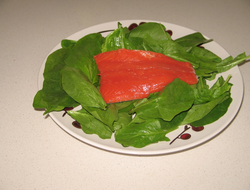Sulfur: not like other minerals
Published: February 22, 2019
However, unlike other minerals sulfur is taken up by your body as a component of organic nutrient molecules.
These molecules include methionine (an essential amino acid), cysteine (a non-essential amino acid) and the vitamins thiamin, biotin and pantothenic acid.
During digestion sulfur remains part of these molecules.
Within your body these sulfur containing compounds are used for various metabolic processes, but at some point they will be metabolised freeing sulfur for use in the synthesis of new organic compounds.
Some sulfur is excreted.
Your body contains approximately 175 g of sulfur which identifies sulfur as a major mineral.
Although sulfur is an essential nutrient, sulfite (a sulfur metabolite) is an allergen and people with sulfite sensitivity should avoid sulfur containing foods.
Link to the full article to learn more about sulfur, its recommended intake, potential deficiency and toxicity, food sources, metabolism, function, and sulfite allergy.
References
1.
Anderson, JJB. (2004). Minerals. In Mann. K. & Escott-Stump, S. (Eds.)(2004). Krause's Food, Nutrition & Diet Therapy. (11th Ed.) Elsevier
2.
Whitney, E. & Rady Rolfes, S. (2005). Understanding Nutrition. Belmont, CA: Thomson Wadsworth
3.
Gropper, S.S., Smith, J.L. & Groff, J.L. (2005). Advanced Nutrition and Human Metabolism (4thEd.). Belmont, CA: Thomson Wadsworth.
4.
Hubbard, S.K. (2004). Medical nutrition therapy for food allergy and food intolerance. In Mann. K. & Escott-Stump, S. (Eds.)(2004). Krause's Food, Nutrition & Diet Therapy. (11th Ed.) Elsevier

